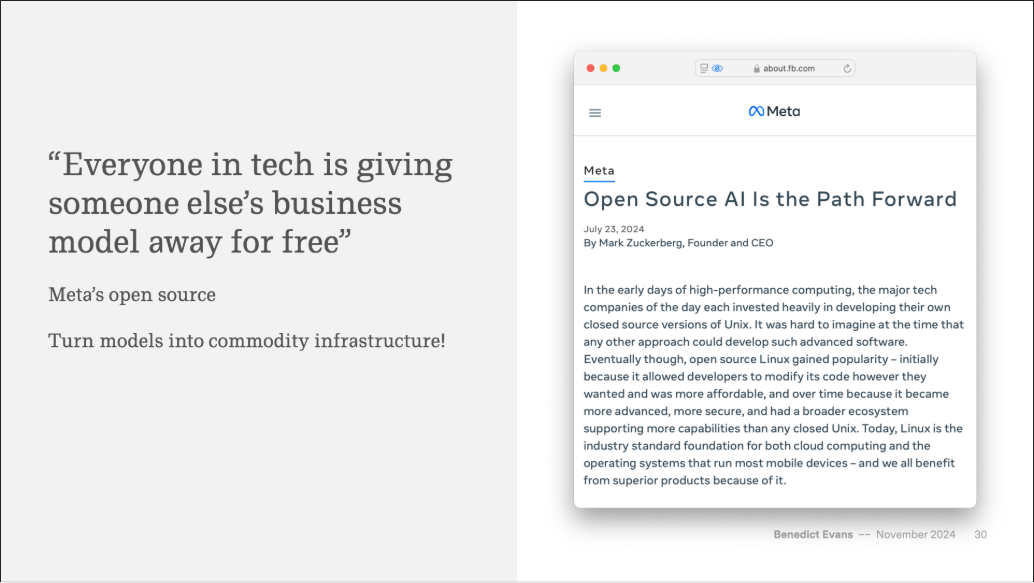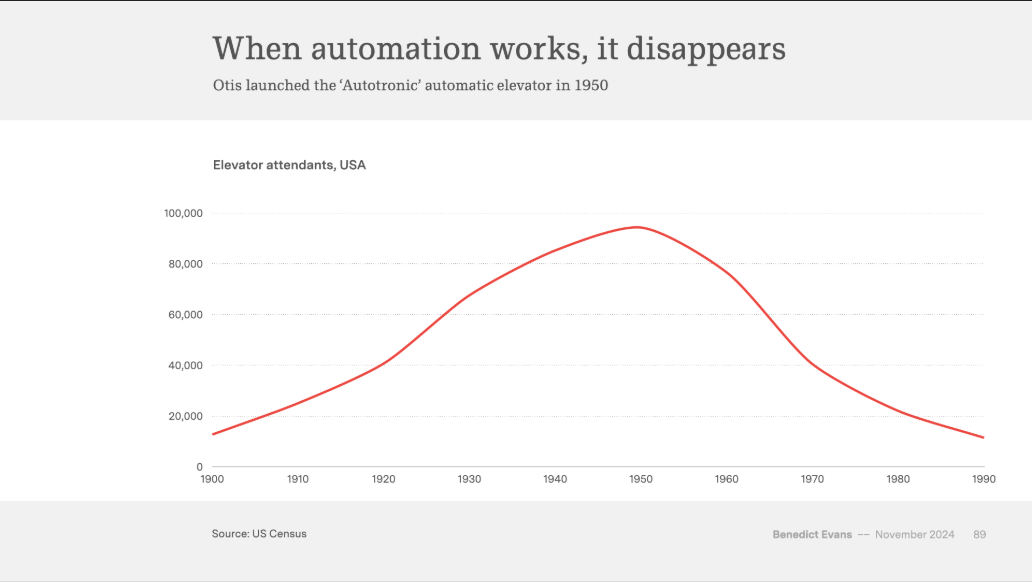Hello AI Enthusiast,
This week, we're doing something different. Instead of our usual main news commenting, we'll dive into Benedict Evans' latest presentation where he explores the strategic trends and realities of AI adoption. We think his analysis offers valuable insights worth sharing with you, especially since many of his points echo themes we've been discussing in our newsletters throughout the year.
You'll still find your weekly dose of AI news in the Bits and Bobs section below.
The Big Picture 🔊
Understanding AI's Place in Tech History
Benedict Evans is a tech industry analyst known for his sharp insights on technology trends. Every year, he creates a presentation that looks at the big shifts in tech and what they mean for business and society. These presentations have become a must-watch in the tech world, as they help make sense of complex industry changes by connecting dots between current events and historical patterns. His latest, "AI eats the world", examines AI's impact through this same lens, comparing it to previous tech revolutions while highlighting what makes this moment unique. You can find the full presentation here.
As we do every week, we discussed it internally, and each of us picked one or two key insights from the presentation that particularly resonated with us. Here's what caught our attention and why we think it matters.


These two slides highlight a strategic shift in AI, from Google's leaked memo admitting "we have no moat" in AI to Meta's aggressive open-source strategy, which aims to turn AI models into commodity infrastructure.

This slide shows Accenture's rapidly growing quarterly revenue from generative AI projects, reaching nearly $1B by August 2024, while noting that most of these projects are still in pilot phase.

This slide explores how LLMs might change the traditional software model, where startups identify use cases, to one where users themselves discover applications through direct interaction with AI.
Speaking of specialized AI solutions, our next GenAI Project Bootcamp starts in January. In just seven weeks, you'll learn how to develop customized AI prototypes that address specific business needs. Through hands-on practice with prompt engineering and no-code implementation, you'll master the skills to design solutions that go beyond generic AI tools.


These slides tell a story about AI adoption and automation: from ChatGPT's varied usage across countries to the historical example of elevator operators becoming obsolete.


These slides contrast the traditional "launch now, monetize later" software model with AI's costly reality, where each new model version, like Llama 4, requires exponentially more computing power.

This slide examines whether AI-powered search could replace traditional search engines, showing a ChatGPT conversation that raises critical questions about accuracy, navigation, and the preprocessing needed for reliable search results.
We tried something different today by focusing on one expert's analysis. Tell us what you think!
Bits and Bobs 🗞️
Anthropic introduced The Model Context Protocol (MCP), an open standard designed to connect AI systems with various data sources seamlessly, replacing fragmented integrations with a unified protocol.
Amazon is investing $4 billion in Anthropic, naming AWS its primary training partner and offering exclusive AI benefits to AWS customers.
Google's AI, Gemini, has introduced a "remember" feature, allowing users to store personal details for more personalized and consistent interactions.
OpenAI has released a new update to its GPT-4o model, enhancing its creative writing abilities for more natural and engaging interactions.
Anthropic's latest update for Claude allows paid users to connect their Google Drive, enabling direct attachment of Google Docs and Sheets in conversations.
OpenAI is expanding ChatGPT’s Advanced Voice Mode to the web for paying subscribers, allowing users to have voice conversations directly in their browsers.
NVIDIA has introduced Fugatto, a generative AI model that uses text and audio inputs to generate and transform sounds, including music, voices, and soundscapes.
On the Podcast 🎧
Our "Behind the Scenes of EU Regulations and AI Policies” series continues! This week, we released an interview with Alberto Pena Fernandez, head of ECAT, exploring how to keep humans in control of AI's future while ensuring European values guide its development.
From Our Channels 🤳
Looks like Benedict Evans isn't the only one with a knack for AI predictions! Check out this TikTok where Gianluca shows how his earlier thoughts on AGI are matching today's reality.
@gianluca.mauro #stitch with @Gianluca Mauro I love being right ❤️ #Ai #learnontiktok #artificialintelligence #business #machinelearning #product #ux #ent... See more
LOLgorithms 😂
This is what happens when your AI facial recognition works too well.
@9gag Ghost said "hold up lemme try" (📹 @notnathanqnqn) - #ghost #failed #facialdetection #supernatural #9gag
That's a wrap on our newsletter! Here’s a quick recap before you go:
Generative AI Project Bootcamp: Learn to craft optimal prompts and integrate them into automated AI prototypes to accelerate processes and test business ideas.
Practical Introduction to ChatGPT: A free course on using ChatGPT confidently, understanding its workings, and exploring its potential.
Customized Corporate Training: Equip your team with the skills they need to unlock the potential of AI in your business.
Catch you next week! 👋






